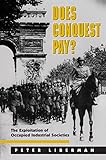Does Conquest Pay? : The Exploitation of Occupied Industrial Societies / Peter Liberman.
Material type: TextSeries: Princeton Studies in International History and Politics ; 74Publisher: Princeton, NJ : Princeton University Press, [1998]Copyright date: ©1995Edition: Course BookDescription: 1 online resource (264 p.) : 4 line illus. 26 tablesContent type:
TextSeries: Princeton Studies in International History and Politics ; 74Publisher: Princeton, NJ : Princeton University Press, [1998]Copyright date: ©1995Edition: Course BookDescription: 1 online resource (264 p.) : 4 line illus. 26 tablesContent type: - 9780691002422
- 9781400821747
- 325.320904 325/.32/0904
- JX5003
- online - DeGruyter
- Issued also in print.
| Item type | Current library | Call number | URL | Status | Notes | Barcode | |
|---|---|---|---|---|---|---|---|
 eBook
eBook
|
Biblioteca "Angelicum" Pont. Univ. S.Tommaso d'Aquino Nuvola online | online - DeGruyter (Browse shelf(Opens below)) | Online access | Not for loan (Accesso limitato) | Accesso per gli utenti autorizzati / Access for authorized users | (dgr)9781400821747 |
Frontmatter -- Contents -- Figures and Tables -- Preface and Acknowledgments -- Chapter 1. Does Conquest Pay? -- Chapter 2. When Does Conquest Pay? -- Chapter 3. Nazi-Occupied Western Europe, 1940-1944 -- Chapter 4. Belgium and Luxembourg, 1914-1918 -- Chapter 5. The Ruhr-Rhineland, 1923-1924 -- Chapter 6. The Japanese Empire, 1910-1945 -- Chapter 7. The Soviet Empire, 1945-1989 -- Chapter 8. The Spoils of Conquest -- Notes -- Works Cited -- Index
restricted access online access with authorization star
http://purl.org/coar/access_right/c_16ec
Can foreign invaders successfully exploit industrial economies? Since control over economic resources is a key source of power, the answer affects the likelihood of aggression and how strenuously states should counter it. The resurgence of nationalism has led many policymakers and scholars to doubt that conquest still pays. But, until now, the "cumulativity" of industrial resources has never been subjected to systematic analysis. Does Conquest Pay? demonstrates that expansion can, in fact, provide rewards to aggressor nations. Peter Liberman argues that invaders can exploit industrial societies for short periods of time and can maintain control and economic performance over the long term. This is because modern societies are uniquely vulnerable to coercion and repression. Hence, by wielding a gun in one hand and offering food with the other, determined conquerors can compel collaboration and suppress resistance. Liberman's argument is supported by several historical case studies: Germany's capture of Belgium and Luxembourg during World War I and of nearly all of Europe during World War II; France's seizure of the Ruhr in 1923-24; the Japanese Empire during 1910-45; and Soviet hegemony over Eastern Europe in 1945-89. Does Conquest Pay? suggests that the international system is more war-prone than many optimists claim. Liberman's findings also contribute to debates about the stability of empires and other authoritarian regimes, the effectiveness of national resistance strategies, and the sources of rebellious collective action.
Issued also in print.
Mode of access: Internet via World Wide Web.
In English.
Description based on online resource; title from PDF title page (publisher's Web site, viewed 30. Aug 2021)


